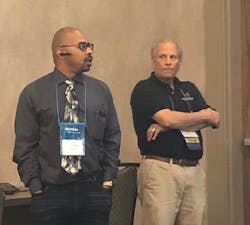Airgas, a supplier of gases, welding equipment, and supplies, has seen its share of change over the years, including being acquired by Air Liquide in 2016. Systems integration between the two companies remains an ongoing project.
When the companies merged, the control system architecture at one of Airgas’ facilities was evaluated, leading to a decision to upgrade the site’s 25-year-old Foxboro I/A distributed control system (DCS). This legacy system was showing signs of wear and tear and becoming harder to maintain due to its age. According to Airgas, this aging DCS would mysteriously shutdown on occasion and the human-machine interface (HMI) would lock up and need to be restarted as many as three times a day. Additionally, the field termination modules were failing frequently.
The upgrade project, a complete rip-and-replace, required the help of integrator Applied Control Engineering, Inc. (ACE). The first task for the integrator involved comparing different control systems from other vendors. Cost cutting was, of course, also a consideration, and minimization of downtime played a key role in the total cost assessment.
Ultimately, the decision was made to upgrade to the Siemens Simatic PCS 7 DCS.
The Design
The project started in 2017 with a front end engineering design (FEED) study to understand the specific capabilities the company needed. This study began with a review of the original documentation of the I/A system from the 1990s.
“We knew how the system looked then, but we needed to know how the system looked in 2019,” said Damon Walker, a controls system specialist for Air Liquide/Airgas during a presentation at the Siemens Automation Summit 2019. “There were a lot of changes over the last 25 years that either were not documented, or we didn’t know where [the documentation] was. We weren’t going to take a 25-year-old system and reproduce that logic. So, we spent a lot of time with the appropriate people asking how they wanted it to work and we designed the spec based on that, which took a lot of time.”
The scope of the project included identifying constraints from cost to downtime to compatibility with field devices; development of the architecture with hardware requirements, redundancy and instrument and signal types; and defining the network (Profinet vs. Profibus and fiber vs. copper).
“We went with Profinet to futureproof the system and that put us into newer I/O,” Walker said. The numerous critical points in the plant required a level of data speed that Profinet also provided. “We decided to go to the SIMATIC ET200SP HA I/O system since it provided for “configure in run” an option needed for a continuous process like ours. And the distances [we had to cover] put us into the fiber realm.”
To get the project going, ACE came up with a plan using a piping and instrumentation diagram (P&ID) and I/O logic. “The system design needed a hierarchy, because the Foxboro system just had code,” said Ken Pilotti, ACE’s technical lead on the project. “That was the first thing we did and got it approved by Airgas. And while that was happening, we had one of the engineers set it up. To do this, we used templates that came with PCS 7 version 9.0 to set up loops, valves, alarms.”
Implementation
The new system reused existing enclosures, but these cabinets had the I/O modules and field wiring installed on opposite sides. The layout forced the team to extend the wires.
“The Foxboro card wiring and the ET200SP HA card wiring was not a one-for-one swap because of I/O density. [Despite the differences] we tried to organize the wires so that it was close,” Pilotti said.
The system’s hardware topology also included redundant servers, engineering workstations, web server and web clients, and an OPC server.
For the software system, the advanced process library (APL) was used, along with a handful of custom blocks. Templates were developed and the Import/Export Assistant was used to develop most of the code. New graphics were developed that resembled the existing graphics to help users transition to the new system.
Though preparation for this upgrade project was two years in the making, the actual cut over from the I/A system to PCS 7 didn’t take long. Airgas went live with PCS 7 in May 2019 after just a 10-day outage to accommodate the upgrade.
Any rip-and-replace project is a scary proposition, but Walker’s boss told him to “go big or go home—and I’m still here” he said, referencing the project’s success.
Based on his experience with this project, Walker offered the following lessons Airgas learned from the DCS upgrade:
- Keep a close eye on budget
- Verify software updates before starting
- Standardize and test control modules
- Standardize alarming conventions (enabling, priorities, etc.)
- Standardize interlocking conventions
- Do comprehensive customer reviews
- Employ good change control management
- Do extensive field installation planning (e.g., more specific wiring cutover plan, fiber installation and testing)
About the Author
Stephanie Neil
Editor-in-Chief, OEM Magazine

Leaders relevant to this article:
